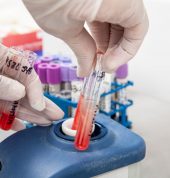Education about lymphoma empowers you to make informed decisions, whether it’s spotting symptoms, lifestyle habits, or seeking help when needed.
Lymphoma is a cancer of the white blood cells which affects the immune system (the body’s germ-fighting system). It primarily starts in a part of the immune system that fights infections and moves fluid around the body (the lymph system). When people have lymphoma, their white blood cells become abnormal and grow out of control.
NOWINCLUDED ambassador, Wynn Sarden, shares his experience with surviving lymphoma twice and how the “journey is much bigger than the diagnosis.”
The signs and symptoms of lymphoma can vary depending on the type and location of the cancer. However, some common signs and symptoms include:
LUMPS OR BUMPS
SWELLING
CHANGES IN YOUR NIPPLE
These resources might help
Living with asthma? Our community member, Eriel, knows a thing or two about managing flare-ups or asthma attacks. In this video, Eriel talks about:


There are many types of lymphoma, and the disease can affect anyone, but certain factors may increase the risk.* These include:

Early detection can come from symptoms or when your doctor does a check-up. Blood tests can sometimes catch signs of lymphoma before symptoms appear. This means the doctors will take a small sample of blood to see if they find signs of an infection or anything strange. There are other ways doctors can spot lymphoma, including: |


If detected early, it is easier to treat lymphoma. Getting regular blood work during your annual exam is one way to help detect and treat the condition early.

They take a tiny piece of tissue from a swollen gland or lump and look at it closely under a microscope to see if there are any bad cells.

They take pictures inside the body using machines to see if there are any lumps or growths.

Sometimes, they also take a small bit of bone to check if there are any bad cells there, too.

If detected early, it is easier to treat lymphoma. Getting regular blood work during your annual exam is one way to help detect and treat the condition early.

They take a tiny piece of tissue from a swollen gland or lump and look at it closely under a microscope to see if there are any bad cells.

They take pictures inside the body using machines to see if there are any lumps or growths.

Sometimes, they also take a small bit of bone to check if there are any bad cells there, too.

If detected early, it is easier to treat lymphoma. Getting regular blood work during your annual exam is one way to help detect and treat the condition early.

They take a tiny piece of tissue from a swollen gland or lump and look at it closely under a microscope to see if there are any bad cells.

They take pictures inside the body using machines to see if there are any lumps or growths.

Sometimes, they also take a small bit of bone to check if there are any bad cells there, too.
Living with lymphoma or just looking for tips on how to be proactive about your health? Explore the resources below.
Learn about the breakthroughs in cancer treatment and the options available for you.
Find out if you may be at risk for this type of lymphoma and how you can take action today.
Find online chat rooms, community forums, and more on our app.
